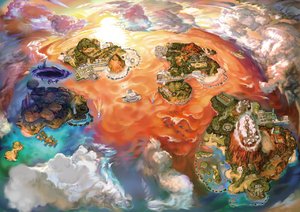Alola: Difference between revisions
OdieboyDuck (talk | contribs) m (→Contemporary history: Typo) |
OdieboyDuck (talk | contribs) m (→Climate: Typo) |
||
| Line 97: | Line 97: | ||
===Climate=== | ===Climate=== | ||
Alola has a warmer climate than other regions, being more tropical, similar to its [[Pokémon world in relation to the real world#Alola|real-world counterpart]] | Alola has a warmer climate than other regions, being more tropical, similar to its [[Pokémon world in relation to the real world#Alola|real-world counterpart]] of {{wp|Hawaii|Hawaii}}. For example, a [[Lush Jungle|thriving rainforest]] grows on [[Akala Island]]. The Pokémon themselves have also adapted to Alola's tropical atmosphere, the biggest example being the {{p|Exeggutor}} that grow on Poni Island, who have reached lengths other Exeggutor are unable to reach, due to the amount of sun that shines over the islands. These Exeggutor match the flora that grow on the islands. However, [[Mount Lanakila]], Alola's highest point, constantly experiences snow and {{weather|hail}} due to its high altitude. | ||
Each of the natural islands also experiences a wide variety of weather conditions. For example, [[Ula'ula Island]] hosts environments with harsh {{weather|sun}}, extreme {{weather|sandstorm}}s, and frequent {{weather|rain}}, in addition to the snow and hail on [[Mount Lanakila]]. [[Exeggutor Island]] is known to have common rain showers, as well, these often result in either rainbows during the day, or meteor showers during the night when the rain clears. | Each of the natural islands also experiences a wide variety of weather conditions. For example, [[Ula'ula Island]] hosts environments with harsh {{weather|sun}}, extreme {{weather|sandstorm}}s, and frequent {{weather|rain}}, in addition to the snow and hail on [[Mount Lanakila]]. [[Exeggutor Island]] is known to have common rain showers, as well, these often result in either rainbows during the day, or meteor showers during the night when the rain clears. | ||
Revision as of 19:39, 23 April 2024
- If you were looking for the first Japanese opening theme of Pokémon the Series: Sun & Moon, see Alola!!.
- If you were looking for the first Korean opening theme of Pokémon the Series: Sun & Moon, see ALOLA!.
| |||||||||||||||||||
| |||||||||||||||||||
| |||||||||||||||||||
| |||||||||||||||||||
| |||||||||||||||||||
| |||||||||||||||||||
| |||||||||||||||||||
| |||||||||||||||||||
The Alola region (Japanese: アローラ地方 Alola region) is a region of the Pokémon world. It was the seventh core series region to be introduced and is the setting of Pokémon Sun, Moon, Ultra Sun, and Ultra Moon.
Alola is made up of four islands: Melemele Island, Akala Island, Ula'ula Island, and Poni Island. In the center is an artificial island by the name of Aether Paradise. It is a popular resort destination and attracts a lot of tourists from other regions. In Alola, humans and Pokémon coexist in a very close relationship, and a culture has developed that is different from other regions.
The island kahuna of each island is known to offer the first partner Pokémon to Trainers beginning their journey of this archipelago. In gameplay, the kahuna of Melemele Island, Hala, will offer the options of Rowlet, Litten, and Popplio to beginner Trainers in Sun and Moon, while in Ultra Sun and Ultra Moon, Professor Kukui of Hau'oli City Outskirts will offer the same three Pokémon under Hala's behalf.
Etymology and design concept
Etymology
According to Shigeru Ohmori, the name "Alola" is meant to incorporate a meaning of a land that overflows with life force and supports various forms of life.[1] Specifically, the name may come from ola (Hawaiian for life) and the traditional Hawaiian word aloha, which, beyond its use as a greeting, also signifies a respect and love for the shared life force between all. This etymology is likely also shared by the Alolan greeting and parting "alola". The adjectival form of Alola is "Alolan", as seen in the term Alolan form.
Design concept
- Main article: Pokémon world in relation to the real world → Alola
Alola is based on Hawaiʻi, an archipelago in the Pacific Ocean and a state of the United States.[2] Each of Alola's natural islands is based on one of the Hawaiian islands:
- Melemele Island is based on the real-world Hawaiian island Oʻahu.
- Akala Island is based on the real-world Hawaiian island Maui.
- Ula'ula Island is based on the real-world Hawaiian island Hawaiʻi (the Big Island).
- Poni Island is based on the real-world Hawaiian island Kauaʻi.
Each natural island in Alola is associated with a color, which corresponds with the official color designation for their real-world counterparts. Each island is also named after the Hawaiian word for their associated color. The colors also correspond with the nectar and flowers available on said island, as well as each island's guardian deity.
History
Dated history
- c. 500 years prior to the events of Pokémon Sun, Moon, Ultra Sun and Ultra Moon, Magearna was built and presented to a king's daughter.
Undated history
- "Hundreds of years ago"
- As the people of Ultra Megalopolis injured Necrozma in an attempt to steal its powers, pieces of its prismatic body were rained down onto different universes, which included Alola's, giving origin to the Sparkling Stones, Z-Crystals, and consequently, to the Z-RingsSM/Z-Power RingsUSUM, and Z-Moves.
- A Pokémon known as the SolgaleoSUS/LunalaMUM emerged from an Ultra Wormhole. Seeing them as a threat, the guardian deities had battled the Legendary Pokémon but were defeated in the end. Solgaleo/Lunala then offered the tapu the Tapunium Z as a reward for their efforts. Afterwards, the Legendary Pokémon, along with it's counterpart, a LunalaSUS/SolgaleoMUM, eventually created a newborn in the form of a Cosmog for the tapu to take care of. This has created a repeated cycle found in the region.
- Necrozma, arrives in Alola through an Ultra Wormhole, stealing all of the light in the region and shrouding it in darkness. During the events it gets a hold of SolgaleoUS/LunalaUM and turns into Dusk Mane NecrozmaUS/Dawn Wings NecrozmaUM. Under the commands of Alola's royalty, the four tapu battled the now dubbed "pillager of light" to retrieve the region's light. With the help of a youth using a Sparkling Stone and Z-Power, the group had managed to defeat and banish Necrozma, restoring the region's light and freeing SolgaleoUS/LunalaUM from it. This had created Alola's tradition of the island challenge. All books related to Necrozma were burned.
- The Battle Royal was created based on battles between the four tapu.
- Ride Pokémon are seen to have existed for hundreds of years.[3]
Contemporary history
The worlds of Pokémon Sun and Pokémon Moon take place in different universes from one another, with the worlds of Pokémon Ultra Sun and Pokémon Ultra Moon taking place in universes different from not only each other but to Sun and Moon as well, causing a set of parallel universes. Pokémon Moon and Ultra Moon have a 12 hour time difference from Sun and Ultra Sun. Alola's contemporary history is different in Sun and Moon compared to Ultra Sun and Ultra Moon.
Before the events of both sets of games, Professor Mohn of the Aether Foundation had conducted research on Ultra Beasts and discovering the existence of Ultra Wormholes, Cosmog, and Nihilego, he had ended up missing prior to the story of the games. Professor Mohn had named Cosmog's species.[4]
Two years prior to the events of the games, Gladion steals a Type: Null species from the Aether Foundation and leaves Aether Paradise. While three months prior, Lillie does a similar act and takes off with a Cosmog that she had also stolen from Aether Paradise. During the process, This Cosmog has transported her to a beach in Alola and is found by Professor Burnet. Lillie stays with both Professor Kukui and Burnet on Melemele Island leading up to the events of the main story. Sometime during this set of events the player character, who is either Selene or Elio leaves Kanto for their new home set on Route 1.
- Pokémon Sun and Moon
The player begins their adventure after meeting Professor Kukui who takes them to receive their first partner Pokémon from Kahuna Hala. During this series of events, the player meets Lillie, mistaking her for the kahuna; her Cosmog; Nebby, and Hala's Grandson, Hau on their way to Iki Town. Nebby gets attacked by wild Spearow on a wooden bridge, to which is destroyed after the player helps protect the Pokémon. Melemele's island guardian, Tapu Koko, saves the two of them and offers the player a Sparkling Stone. The player receives their first partner Pokémon and a Z-Ring at the festival inaugurating their island challenge, consisting of seven trials and four grand trials in order to become the island challenge champion. Along their journey, they encounter a group called Team Skull, whose members are misfits who failed the island challenge and aim to cause trouble, as well as the Aether Foundation, whose goal is to cure hurt Pokémon. Midway through their island challenge, the player is brought on a tour of Aether Paradise, where they find a Nihilego, an Ultra Beast and are tasked to defeat it. After defeating the leader of Team Skull, Guzma, at the Shady House, they learn that Lillie was taken away by Team Skull, and upon Gladion's request, him, the player and Hau travel to Aether Paradise to rescue Lillie, where they battle Lusamine, the president of the Aether Foundation who is also revealed to be Lillie and Gladion's mother. Lusamine opens Ultra Wormholes across Alola and enters one with Guzma. The player and Lillie evolve Nebby into SolgaleoS/LunalaM at the Altar of the SunneS/Altar of the MooneM and travel into Ultra Space, where the player battles Lusamine once again and brings her and Guzma back to Alola. The player catches Nebby after Lillie tells it that she isn't a Trainer. The player then climbs to the summit of Mount Lanakila, where the newly opened Pokémon League stands. They defeat the Elite Four and Professor Kukui, becoming the first Champion of Alola. A festival is held in Iki Town, and Lillie brings them to the Ruins of Conflict to thank Tapu Koko.
The next day, Lillie leaves on boat for Kanto to help her sickly mother. The International Police contact the player to investigate and catch the Ultra Beasts unleashed across Alola.
- Pokémon Ultra Sun and Ultra Moon
Similar to the above, prior to the events of the games, Gladion and Lillie both steal Pokémon from the Aether Foundation. The player moves to Alola.
The player begins their adventure after meeting Professor Kukui who provides them with their first partner Pokémon on Kahuna Hala's behalf. During this series of events, the player meets Lillie, mistaking her for the kahuna; her Cosmog; Nebby, and Hala's Grandson, Hau on their way to Iki Town. Nebby gets attacked by wild Spearow on a wooden bridge, to which is destroyed after the player helps protect the Pokémon. Melemele's island guardian, Tapu Koko, saves the two of them and offers the player a Sparkling Stone. The player receives a Z-Power Ring at the festival inaugurating their island challenge, consisting of eight trials and four grand trials in order to become the island challenge champion. Once again the player comes across Team Skull and the Aether Foundation, battling a wild Nihilego found on Aether Paradise. However, the player is also met with a new group known as the Ultra Recon Squad, who are associated with Aether. After defeating the leader of Team Skull, Guzma, at the Shady House, they learn that Lillie was taken away by Team Skull, and upon Gladion's request, him, the player and Hau travel to Aether Paradise to rescue Lillie, where they battle Lusamine, the president of the Aether Foundation who is also revealed to be Lillie and Gladion's mother. Lusamine opens a single Ultra Wormhole to enter with Guzma in a plot to stop Necrozma from stealing Alola's light. The player and Lillie evolve Nebby into SolgaleoUS/LunalaUM at the Altar of the SunneUS/Altar of the MooneUM however, before they can go into Ultra Space, Lusamine and Guzma are immediately ejected from an Ultra Wormhole, being defeated by Necrozma. Necrozma soon follows and captures Nebby and takes control of its body, becoming Dusk ManeUS/Dawn Wings NecrozmaUM, and proceeds to not only summon Ultra Beasts into Alola, but steals all of Alola's light. With help from the Ultra Recon Squad, the player rides atop a LunalaUS/SolgaleoUM and goes to Ultra Megalopolis to chase down Necrozma, who then uses the light it took from Nebby to become Ultra Necrozma, its original form. The player successfully defeats Necrozma and separates Nebby from it, returning the light to Alola. The player then finishes their island challenge and climbs Mount Lanakila where they defeat Hau, as their final obstacle and becoming the first Champion of Alola. A festival is held in Iki Town.
Gladion leaves for Kanto and Johto by boat. The player then returns home, where they are contacted by Hau and the Ultra Recon Squad to catch BlacephalonUS or StakatakaUM. They then learn of Team Rainbow Rocket, who take over the Festival Plaza and Aether Paradise. Lillie reaches out to the player for help and they intervene, dealing with several Rainbow Rocket Grunts in the altered Aether Paradise, now known as Team Rocket's Castle. The organization is ran by several villainous Team Leaders from previous video games: Archie, Maxie, Cyrus, Lysandre, and Ghetsis; all coming from timelines where they were successful in their plans. Finally, they reach Lusamine's chamber and defeat Rainbow Rocket's head leader, Giovanni, who then leaves Paradise and restores it to normal after his defeat. However, before he leaves, he subtly implies he has yet more plans in mind. Gladion returns a month later after Giovanni's defeat, allowing him and his mother to reunite with his father in unexpected ways.
Geography
Environment

The Alola region consists of four main islands: Melemele Island, Akala Island, Ula'ula Island, and Poni Island. It also includes one artificial island, Aether Paradise, described as a "very large floating structure" or VLFS, and Poké Pelago, a group of small, uninhabited islands. People can travel between the islands via boat, the Poké Ride's Charizard Glide, and Mantine Surf; it is not possible to use the Poke Ride's Lapras Paddle or Sharpedo Jet, or any field moves, to move between the islands. All four natural islands are, to an extent, forested and mountainous. Most of these islands' cities and towns are on the coast, with the notable exceptions of Iki Town and Paniola Town. Routes are relatively developed here compared to other regions, with several of them having their own Pokémon Centers in addition to residential buildings.
Though steeped in nature, Melemele Island, in the northwest of the archipelago, has the least extreme environments. It is home to Alola's largest settlement, Hau'oli City. Its routes gently slope up towards the center of the island to form a gradual mountain, on top of which are the Ruins of Conflict. A notable Melemele Island landmark is Ten Carat Hill, which was formed out of an underwater volcano and has an open-air hollow in the middle, itself resembling a volcano.
Akala Island, in the northeast of the archipelago, contains Alola's only active volcano, in Wela Volcano Park. It also has the most settlements of the four natural islands. Its largest city, Heahea City, boasts several huge resort hotels, such as the Hano Grand Resort, which has its own beach and golf course. A notable Akala Island landmark is Brooklet Hill, which has cascading waterfalls that give off the impression of a terrace field. The island is also contains a rainforest known as Lush Jungle.
Ula'ula Island, in the southeast of the archipelago, is the largest of Alola's islands. It is also the most varied in terms of weather and terrain, with significantly rougher terrain areas than other islands. For such a large island, it has few settlements: Malie City, the largest city in Ula'ula; Tapu Village, destroyed by the tapu a long time ago, contains just a Pokémon Center; and Po Town, occupied by Team Skull. These settlements all sit in the shadow of a contiguous mountain range in the heart of the island, which includes three mountain peaks and a harsh desert. On the southwest coast of the island is a large lagoon with breakable rocks that the Poké Ride's Sharpedo Jet can break through. Notable Ula'ula Island landmarks are the Lake of the Moone and the Lake of the Sunne, both perfectly circular lakes that have special connections to the Legendary Pokémon of Alola, Solgaleo and Lunala.
Poni Island, in the southwest of the archipelago, is the most sparsely populated of Alola's islands. It only contains one settlement in Ancient Poni Path, however the Seafolk Village is a gathering location of seafarring people. Similar to the Battle Zone in Sinnoh, it is full of rugged and harsh environments. Though its coasts are fairly flat, the island is mostly mountainous and rocky, in part due to the sprawling Vast Poni Canyon — described as a natural trial site — that takes up over half the island's land. Exeggutor Island, a smaller unihabited island that was once its own trial site, can be accessed in Seafolk Village.
Aether Paradise, just west of the center of the archipelago, starkly contrasts with the natural islands. It is strikingly modern, with a huge building in the center that serves as both the main area and the headquarters of its owners, the Aether Foundation. Behind this building is a sprawling mansion that serves as the office and residence of its head, Lusamine.
Among Alola's four islands is another smaller archipelago known as Poké Pelago. This archipelago is uninhabited by people, despite this, Mohn has made it a paradise for Trainer-owned Pokémon and has several different islands and attractions for their Pokémon to take part in.
Climate
Alola has a warmer climate than other regions, being more tropical, similar to its real-world counterpart of Hawaii. For example, a thriving rainforest grows on Akala Island. The Pokémon themselves have also adapted to Alola's tropical atmosphere, the biggest example being the Exeggutor that grow on Poni Island, who have reached lengths other Exeggutor are unable to reach, due to the amount of sun that shines over the islands. These Exeggutor match the flora that grow on the islands. However, Mount Lanakila, Alola's highest point, constantly experiences snow and hail due to its high altitude.
Each of the natural islands also experiences a wide variety of weather conditions. For example, Ula'ula Island hosts environments with harsh sun, extreme sandstorms, and frequent rain, in addition to the snow and hail on Mount Lanakila. Exeggutor Island is known to have common rain showers, as well, these often result in either rainbows during the day, or meteor showers during the night when the rain clears.
Ecology
The ecology of Alola is described as being diverse. While plenty of the Pokémon who live in Alola has lived with human natives for generations, plenty of new Pokémon from other regions have shown up recently as well.[5] Alola's environmental conditions affect its Pokémon in various ways. To adapt to the unique environmental pressures of their Alolan habitats, a number of Pokémon species originally found in the Kanto region have developed regional forms named Alolan forms. Alolan Exeggutor, for instance, are five times as tall as those in other regions due to Alola's abundant sunlight, and Alolan Vulpix, which moved to snowy mountain peaks to avoid the normal habitats of other Pokémon, adapted to their new environment by becoming Ice-type. In adition to this, some Pokémon are known to only live on individual islands, due to each island's subclimates. This has also affected some Pokémon, such as Oricorio, who are known to change their form depending on the type of nectar and flora present on the island its found in. Vast Poni Canyon, Blush Mountain, Lush Jungle and Mount Lanakila are locations which can induce certain Pokémon to evolve.
What has added to this diversity is also the inclusion of Pokémon being brought over from other regions, however this had lead to the issue of multiple invasive species, such as Alolan Rattata and Gumshoos. The rare phenomena known as Ultra Wormholes infrequently appear throughout Alola, causing a disruption of non-native Pokémon known as Ultra Beasts to appear, harming the peace and wildlife. These wormholes, which link to other dimensions, are known to pour Z-Power into the region, which has allowed some Pokémon to enlarge in size and creating the Totem Pokémon found at trial sites.
Alola is also known to be rather lush in greenery, being rich in vegatation and flora. Have multiple tropically diverse trees and flowers, with each island having different types of plants not found in the others. For example, the flowers that Oricorio use for food come in colors correspnding to the island's name; with Mememele Island containing a meadow with yellow flowers. While each island has its own plants, they share many similarties too, with many Berry Trees used for harvesting berries being found. Route 2 in particular even has a Berry field. These Berry Trees often drop different types of berries, to which Pokémon like Crabrawler feed from.
Poké Pelago has ecology that differs from Alola's main four islands, but is still environmentally tropical. Here, Poké Beans naturally grow, and can be given to Pokémon as a form of delicacy. Wild Pokémon are known to appear on these islands, being attracted to the Poké Beans and Berries that may grow on the islands. Similarly, Exeggutor Island appears to be environmentally different based on version, in Sun and Moon; it appears to be more dry and earthy, matching mainland Poni Island; while in Ultra Sun and Ultra Moon, Exeggutor Island is much more lush and green, filled with plant life. It is also unihabited by people.
Demographics
The Alola region has a total population of 1005USUM, including all towns, cities, and other areas. Since its introduction in Generation VII, it has been the second largest region by population.
Notable locations
Alola has nine cities and towns, a big avenue and a Pokémon League. Like in Unova and Kalos, the routes of Alola start counting again from 1, likely to represent its geographical isolation from the original four regions. There are 17 routes in total, although there are many other locations in the form of a route that in this region are named differently, such as Akala Outskirts or Poni Grove.
Settlements
| Map | Name | Population | Description |
|---|---|---|---|

|
Iki Town | 18SM 19USUM | An old town where traditions have been passed on for generations. The villagers here are close with Tapu Koko. |

|
Hau'oli City | 97USUM | Beachfront: A popular spot where locals like to gather. Even people from other towns come to Hau'oli City to visit this beach. Shopping District: The bustling center of the city, where you can get everything from fashion items to popular treats to eat.SM The center of the city, where more and more people have become fashion conscious to take commemorative photos.USUM Marina: A harbor where you can set out for the other islands. It's visited by many people and boats. |

|
Heahea City | 82USUM | Considered the "front door" to Akala Island, this town's residents treasure visitors and welcome them most warmly. |

|
Paniola Town | 16USUM | A town located in the middle of Akala Island and surrounded by ranch land and pastures for grazing. |

|
Royal Avenue | 56SM | A major street that has developed so much thanks to the Battle Royal Dome being on it, making it look like a city street. |
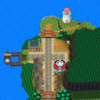
|
Konikoni City | 55USUM | The large gateway at the entrance gives a unique impression. This is a city of merchants, where you find lots of shops.SM This is a city of merchants, where you find lots of shops and even a photo club, beyond the gate at the entrance.USUM |

|
Malie City | 84SM | A city with an obvious Eastern influence in its design. The architecture is distinctive here. Outer Cape: A cape famous for its Recycling Plant. The plant is co-managed by people and Pokémon. |
| Tapu Village | 17USUM | The remains of a village said to have been destroyed by the island's tapu when the people roused its anger. | |
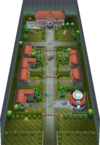
|
Po Town | 8USUM | A town barricaded with tall walls that seem to reach the sky. It is occupied by Team Skull. |

|
Seafolk Village | 29USUM | The village of a wandering people who live on ships. They all seem to love living free and unfettered. |

|
Pokémon League | 11USUM | The place where the most powerful Trainer in the Alola region will be decided. Coming soon! |
Landmarks
| Map | Landmark | Description |
|---|---|---|
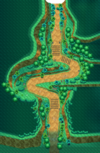
|
Mahalo Trail | A mountainous trail that leads to the sacred ruins. The cool air up here is very soothing on the skin. |

|
Hau'oli Cemetery | The people and Pokémon on Melemele Island share their lives, and here they have also shared their graves for generations. |

|
Berry fields | A Berry field with soft soil. It is the pride and joy of the local Berry master. |

|
Verdant Cavern | A cave with a great variety of plants thriving inside it. The light shafting in from above makes for a breathtaking sight. |

|
Melemele Meadow | A place where yellow flowers bloom in abundance. You can gather the nectar Oricorio loves to feed on here. |

|
Seaward Cave | A cave that connects Melemele Meadow and Kala'e Bay. It is filled with salty smell of the sea. |

|
Kala'e Bay | One of the most scenic spots on Melemele Island. It was chosen as one of the top 100 views in Alola. |

|
Ten Carat Hill | A great hill formed by the activity of an underwater volcano. It is famous for the hollow in its middle that is open to the air. |

|
Paniola Ranch | The ranch managed together by the people and Pokémon living in Paniola Town. |
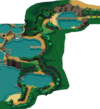
|
Brooklet Hill | The best fishing spot in the Alola region. Its series of cascading waterfalls make it look like a terrace field. |

|
Melemele Sea | This sea is crowded with Melemele islanders, local Pokémon, and visiting tourists all year round. |

|
Wela Volcano Park | A mountain with steep paths and waste lands. There is a trial site on top. |

|
Lush Jungle | A heavily wooded tropical rain forest. It's famous for producing ingredients for delicious meals. |

|
Diglett's Tunnel | Diglett and people worked together to finish digging this tunnel several years ago. |

|
Memorial Hill | A place where the memories of people and Pokémon linger. Many people come from other islands to visit this graveyard. |

|
Akala Outskirts | A grassy stretch along Akala's southern-most coast. It leads from Memorial Hill to the Ruins of Life. |

|
Ruins of Life | The ruins that enshrine Tapu Lele, one of the land spirits. It is said that life is born here. |

|
Hano Grand Resort | The biggest of all the resorts in the Alola region. The hotel is fully booked a year in advance. |
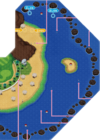
|
Hano Beach | The beach near Hano Grand Hotel at the Hano Grand Resort. Pyukumuku-chucking is a popular part-time job to do here. |

|
Aether Paradise | A VLFS or a "very large floating structure." This is where the Aether Foundation's research facilities are. |

|
Malie Garden | A well-manicured garden located in the middle of Malie City. The large lake within it seems to resemble something... |
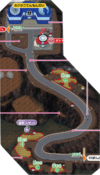
|
Mount Hokulani | A mountain suitable for observing the stars. There is an observatory on top. |
| Hokulani Observatory | A research facility for observing and studying various phenomena in space. | |

|
Blush Mountain | The mountain where the Geothermal Power Plant is situated. Its output covers almost all of Ula'ula Island's electric needs. |

|
Secluded ShoreSM Ula'ula BeachUSUM |
A small patch of shore on the southern coast of Ula'ula Island. A rather isolated and unwelcoming place.SM A beach that spreads on the southern coast of Ula'ula Island. A very popular and busy place for Mantine Surf.USUM |

|
Aether House | Where Pokémon and people huddle together. |

|
Thrifty Megamart (Abandoned Site) | The original site of the first Thrifty Megamart store. It is said to have been destroyed by the island's tapu. |

|
Haina Desert | A scorching-hot desert beyond Route 13. Trainers often get lost here in this broiling labyrinth. |

|
Ruins of Abundance | The ruins that enshrine Tapu Bulu, one of the land spirits. It is said that life grows here. |

|
Ula'ula Meadow | A place where red flowers bloom in abundance. You can gather the nectar Oricorio loves to feed on here. |

|
Lake of the Moone | A place that seems to have some connection to the Alola's Legendary Pokémon. The lake forms a perfect circle. |

|
Lake of the Sunne | A place that seems to have some connection to the Alola's Legendary Pokémon. The lake forms a perfect circle. |

|
Shady House | A mansion abandoned by a certain rich citizen. People sometimes call it the "Shady Chateau," too. |

|
Poni Wilds | The entrance to Poni Island. It connects to Seafolk Village. |

|
Ancient Poni Path | An old path that leads to Vast Poni Canyon. Some people and Pokémon still try to live in the ruins here, but not many. |

|
Poni Breaker Coast | The southern coast of Poni Island, where rough waves pound mercilessly upon the shore. |

|
Ruins of Hope | The ruins that enshrine Tapu Fini, one of the land spirits. It is said that life ends its journey here. |
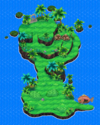
|
Exeggutor Island | It's a paradise for Exeggutor! This island is designated as a special preserve. |

|
Vast Poni Canyon | The most challenging path on Poni Island. The ups and downs of this canyon are beyond any other. |

|
Altar of the Sunne | An altar that is said to be closely associated with the Legendary Pokémon depicted in the local folklore. |

|
Altar of the Moone | An altar that is said to be closely associated with the Legendary Pokémon depicted in the local folklore. |

|
Mount Lanakila | The roughest and coldest mountain in the Alola region. A large-scale construction project has been taken up here. |
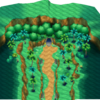
|
Ruins of Conflict | The ruins that enshrine Tapu Koko, one of the land spirits. It is said that life is tested here. |
| Poni Grove | A natural path that winds among the many trees. It leads to the eastern side of Poni Island. | |

|
Poni Plains | The plains that lead to the northern part of Poni Island. There is also a path connecting to Poni Meadow from here. |
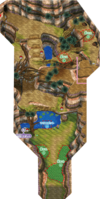
|
Poni Meadow | A place where purple flowers bloom in abundance. You can gather the nectar Oricorio loves to feed on here. |

|
Resolution Cave | A cave that leads deep, deep down under the ground. How it got the name "resolution" is not known. |
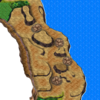
|
Poni Coast | The north-eastern coast of Poni Island, where the clarity of the water makes it a popular view spot. |
| Poni Gauntlet | A difficult path that leads to the Battle Tree. It's full of tough Trainers. | |

|
Battle Tree | The sacred battle grounds for the toughest Trainers of the Alola region. |

|
Poké Pelago | |

|
Festival Plaza | |

|
Big Wave Beach | A beach with huge waves. It's located near a motel. It's one of the Mantine Surf Spots. |

|
Sandy Cave | The vast sea spreads, and various Pokémon live among rocks. |

|
Heahea Beach | A bustling beach connecting to Heahea City. It's one of the Mantine Surf Spots. |

|
Pikachu Valley | Electric paradise. |
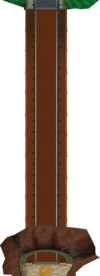
|
Dividing Peak Tunnel | |
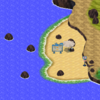
|
Poni Beach | A beach on Poni Island with an abundance of nature. It's one of the Mantine Surf Spots. |

|
Plains Grotto | |

|
Team Rocket's Castle |
Anime-exclusive
| Picture | Location | Description |
|---|---|---|

|
Aina's Kitchen | A cafeteria located on Melemele Island. It is run by Abe with help from his daughter Mallow and is a popular place to eat. |

|
Alola TV | The main television production and broadcasting hub in the Alola region over the past 55 years. |

|
Bamboo Hill | A hill on Melemele Island that serves as a camping site and contains bamboo trees. |

|
Bewear's den | The secret base of Team Rocket, located in a hollowed-out tree found within the dense forests of Melemele Island. |

|
Clawmark Hill | A mountain located near Professor Kukui's house on Melemele Island where wild Pokémon spar at night. |

|
Manalo Stadium | A stadium built by the Aether Foundation, located in the ocean near Aether Paradise. It was built specifically to host the Alola League Conference. |

|
Oranguru's place | A café found in a forest on Melemele Island. It is run by an Oranguru who supplies drinks to customers and listens to them as they vent any problems that they have. |

|
Pokémon Paradise Resort | A hot spring resort on Akala Island where both humans and Pokémon can relax. |

|
Pokémon School | A school on Melemele Island where Trainers of varying ages meet to improve themselves. Samson Oak is the principal. |

|
Starfall Hill | A hill located atop Mount Hokulani on Ula'ula Island. It is known for the large amount of Minior that fall down there from space. |

|
Treasure Island | An island located near Melemele Island, which is home to many wild Pokémon. |

|
Viren Stadium | A stadium on Melemele Island built by Viren to host Pokémon Base matches and Viren's own Pokémon Base team. |
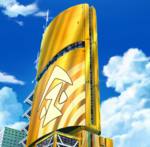
|
Viren Tower | A tower on Melemele Island built by Viren, who records his own TV programmes such as Viren Shopping Network (Japanese: ブルガンショッピング Bourgain Shopping) here. |
Manga-exclusive
| Picture | Location | Manga | Description |
|---|---|---|---|
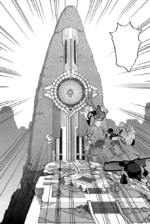
|
Poni Altar | Pokémon Adventures | An amalgamation of the games' Altar of the Sunne and Altar of the Moone. It is a stone altar associated with the light trio. |
Appearance
Artwork
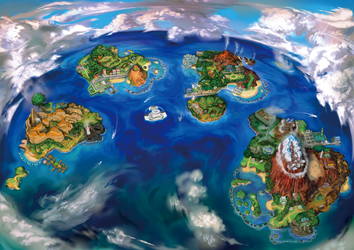
|
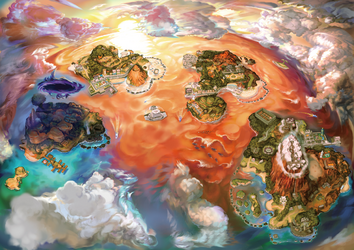
|
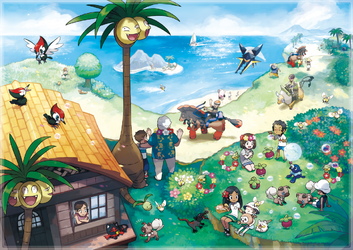
|
| Overhead view of Alola from Pokémon Sun and Moon | Overhead view of Alola from Pokémon Ultra Sun and Ultra Moon | Artwork of Alola from Pokémon Sun and Moon |
In-game
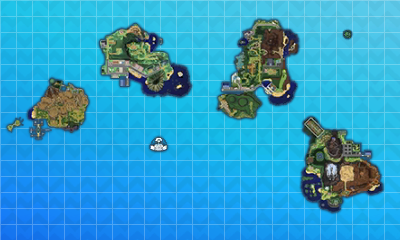
|
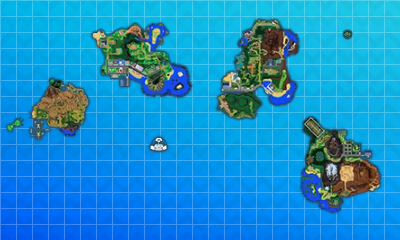
|
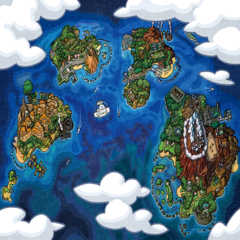
|
| Alola as seen in Pokémon Sun and Moon |
Alola as seen in Pokémon Ultra Sun and Ultra Moon |
Selene's sync move mindscape from Pokémon Masters EX |
Island challenge
- Main article: Island challenge
The island challenge is a rite of passage in the Alola region consisting of trials on each of Alola's four main islands. Each trial has a Trial Captain who provides guidance to Trainers undertaking a trial. At the end of each trial, Trainers must face a Totem Pokémon in an SOS Battle. The final trial on each island is called the grand trial, where the Trainer must battle the island kahuna. The goal of those taking the island challenge is to become the strongest Trainer, known as the island challenge champion.
Captains and Totem Pokémon
Melemele Island
| Melemele Island | ||||
|---|---|---|---|---|
| Generation VII | Region: Alola | |||
| Trial Captain Japanese |
Location Japanese |
Type | Totem Pokémon | Ally Pokémon |
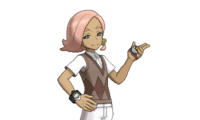 Ilima イリマ Ilima |
Verdant Cavern 茂みの洞窟 Verdant Cavern |
Normal |
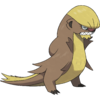 GumshoosSUS |
YungoosSUS |
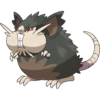 Alolan RaticateMUM |
Alolan RattataMUM | |||
Akala Island
| Akala Island | |||||
|---|---|---|---|---|---|
| Generation VII | Region: Alola | ||||
| Trial Captain Japanese |
Location Japanese |
Type | Totem Pokémon | Ally Pokémon | |
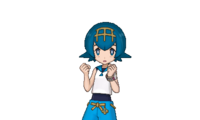 Lana スイレン Suiren |
Brooklet Hill せせらぎの丘 Brooklet Hill |
Water |
 Wishiwashi (School Form)SM |
WishiwashiSM |
AlomomolaSM |
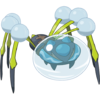 AraquanidUSUM |
DewpiderUSUM |
MasquerainUSUM | |||
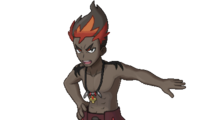 Kiawe カキ Kaki |
Wela Volcano Park ヴェラ火山公園 Wela Volcano Park |
Fire |
 SalazzleSM |
SalanditSM |
|
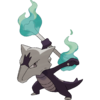 Alolan MarowakUSUM |
SalazzleUSUM |
||||
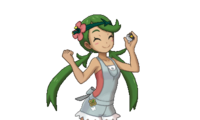 Mallow マオ Mao |
Lush Jungle シェードジャングル Shade Jungle |
Grass |
 Lurantis |
TrumbeakSM |
CastformSM |
ComfeyUSUM |
KecleonUSUM | ||||
Ula'ula Island
| Ula'ula Island | |||||
|---|---|---|---|---|---|
| Generation VII | Region: Alola | ||||
| Trial Captain Japanese |
Location Japanese |
Type | Totem Pokémon | Ally Pokémon | |
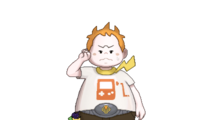 Sophocles マーマネ Mamane |
Hokulani Observatory ホクラニ天文台 Hōkūlani Observatory |
Electric |
 VikavoltSM |
CharjabugSM |
CharjabugSM |
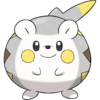 TogedemaruUSUM |
SkarmoryUSUM |
DedenneUSUM | |||
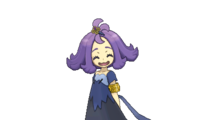 Acerola アセロラ Acerola |
Thrifty Megamart (Abandoned Site) スーパー・メガやす 跡地 Supermarket Megacheap (Abandoned Site) |
Ghost |
 Mimikyu |
HaunterSM |
GengarSM |
BanetteUSUM |
JellicentUSUM | ||||
Poni Island
| Poni Island | |||||
|---|---|---|---|---|---|
| Generation VII | Region: Alola | ||||
| Trial Captain Japanese |
Location Japanese |
Type | Totem Pokémon | Ally Pokémon | |
| None | Vast Poni Canyon ポニの大峡谷 Great Canyon of Poni |
Dragon |
 Kommo-o |
Hakamo-oSM |
ScizorSM |
NoivernUSUM |
ScizorUSUM | ||||
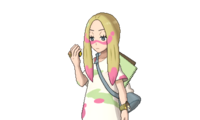 Mina マツリカ Matsurika |
NoneSM | Fairy |
NoneSM | NoneSM | |
| Seafolk Village 海の民の村 Seafolk VillageUSUM |
 RibombeeUSUM |
BlisseyUSUM |
PelipperUSUM | ||
Island kahunas
| Island kahunas | ||||
|---|---|---|---|---|
| Generation VII | Region: Alola | |||
| Island kahuna Japanese |
Island | Location Japanese |
Type | |
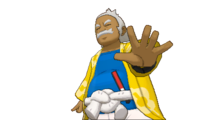 Hala ハラ Hala |
 Melemele Island |
Iki Town リリィタウン Liliʻi Town |
Fighting | |
 Olivia ライチ Lychee |
 Akala Island |
Ruins of Life 命の遺跡 Ruins of Life |
Rock | |
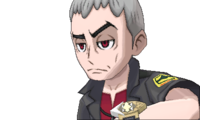 Nanu クチナシ Kuchinashi |
 Ula'ula Island |
Malie City マリエシティ Malie City |
Dark | |
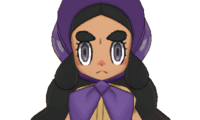 Hapu ハプウ Hapū |
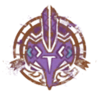 Poni Island |
Vast Poni CanyonSM ポニの大峡谷 Great Canyon of Poni |
Ground | |
| Exeggutor IslandUSUM ナッシー・アイランド Nassy Island | ||||
Alola League
- Main article: Alola League
A Pokémon League for the Alola region was developed on top of Mount Lanakila by Professor Kukui only recently. As a result, the Alola League has no Pokémon Champion. Instead, in Sun and Moon, after defeating the Elite Four, the player must battle Kukui, the founder of the League, in order to formally attain the title of Alola's first Pokémon League Champion. In Ultra Sun and Ultra Moon, the player battles their rival Hau instead.
Elite Four
| Alola League | |||
|---|---|---|---|
| Generation VII | |||
| Member Japanese |
Type | ||
 Hala ハラ HalaSM |
 Molayne マーレイン MulleinUSUM |
Fighting | Steel |
 Olivia ライチ Lychee |
Rock | ||
 Acerola アセロラ Acerola |
Ghost | ||
 Kahili カヒリ Kahili |
Flying | ||
Trivia
- Alola is the only core series region:
- To have the player's home not be located in a city or town. Instead, it is located on Route 1.
- To have an Elite Four member change within a single generation.
- Whose name is a palindrome.
- To have more than one burial ground at once.
- Alola is the only core series region to not introduce notable Ice-type expert.
- However, Sina, who comes from Kalos, being introduced in Pokémon X and Y, is revealed to be an Ice-type expert when the player meets her in Alola.
- Alola is the first core series region taking place in the modern day not featuring:
- Gym Leaders, Gyms, and Badges.
- A Pokémon League Champion that precedes the player.
- A diploma received from someone upon completing the Pokédex.
- HMs and field moves.
- Cuttable plants.
- Roaming Pokémon.
- Alola is the least visited core series region in Pokémon Journeys: The Series, only being visited in three episodes.
See also
In other languages
| Language | Name | Origin |
|---|---|---|
| German, Spanish, French, Italian, Portuguese, Czech, Danish, Finnish, Indonesian, Malaysian, Norwegian, Dutch, Polish, Romanian, Swedish, Turkish, Vietnamese |
Alola | From its Japanese and English name |
| Korean | 알로라 Alola | Transcription of its Japanese name |
| Chinese (Mandarin) | 阿羅拉 / 阿罗拉 Āluólā | Transcription of its Japanese name |
| Chinese (Cantonese) | 阿羅拉 Alòhlāai | |
| Greek | Αλόλα Alola | Transcription of its English name |
| Hebrew | אלולה Alola | Transcription of its English name |
| Russian | Алола Alola | Transcription of its English name |
| Thai | อโลลา Alola | Transcription of its Japanese name |
References
- ↑ Nintendo Treehouse: Live at E3 (recorded)
- ↑ (May 23, 2016). Junichi Masuda's LINE blog (archived June 18, 2023)
- ↑ Pokémon Legends: Arceus takes place an undocumented number of years before any other title in the franchise. Within said title, Professor Laventon claims, "Remarkable! Truly outstanding stuff! A Pokémon letting someone ride on it... Why, it's just like the Ride Pokémon of Alola!" Implying the service had existed prior to Legends: Arceus.
- ↑ Pokémon Sun and Moon official website (archived): "The Aether Foundation is researching this unusual Pokémon, and one of the professors at the foundation recently dubbed it Cosmog."
- ↑ Pokémon Sun and Moon official website (archive)
| Regions in the Pokémon world | ||
|---|---|---|

|
This article is part of Project Locations, a Bulbapedia project that aims to write comprehensive articles on every location in the Pokémon world. |
